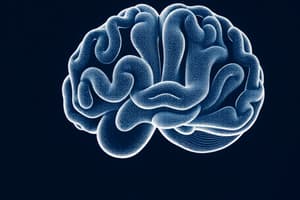Podcast
Questions and Answers
Which of the following best describes the role of self-regulation in emotional intelligence?
Which of the following best describes the role of self-regulation in emotional intelligence?
- Recognizing and understanding one's own emotions.
- Managing emotions and impulses effectively. (correct)
- Building rapport and resolving conflicts.
- Understanding and sharing the feelings of others.
In the context of life coaching, what is the primary purpose of 'powerful questioning'?
In the context of life coaching, what is the primary purpose of 'powerful questioning'?
- To evaluate the client’s past performance and identify mistakes.
- To provide direct answers and solutions to the client's problems.
- To encourage reflection, insight, and new perspectives in the client. (correct)
- To set specific, measurable goals for the client.
Which of the following is NOT typically a direct benefit of higher emotional intelligence?
Which of the following is NOT typically a direct benefit of higher emotional intelligence?
- Increased resilience and adaptability to change.
- Guaranteed financial success and wealth accumulation. (correct)
- Improved leadership skills and team motivation.
- Enhanced personal and professional relationships.
What is the significance of 'informed consent' in the ethical practice of life coaching?
What is the significance of 'informed consent' in the ethical practice of life coaching?
Which life coaching technique focuses on creating mental images of desired outcomes to boost motivation and confidence?
Which life coaching technique focuses on creating mental images of desired outcomes to boost motivation and confidence?
A client consistently fails to complete agreed action steps between coaching sessions. Which challenge in life coaching does this scenario exemplify?
A client consistently fails to complete agreed action steps between coaching sessions. Which challenge in life coaching does this scenario exemplify?
What does assessing emotional intelligence primarily involve in the context of integrating EI in life coaching?
What does assessing emotional intelligence primarily involve in the context of integrating EI in life coaching?
What is TRUE about the future trends in emotional intelligence and life coaching?
What is TRUE about the future trends in emotional intelligence and life coaching?
Which of the following scenarios best illustrates the life coaching technique of active listening?
Which of the following scenarios best illustrates the life coaching technique of active listening?
A life coach is also the client's Alcoholics Anonymous sponsor. What ethical consideration is most directly being violated in this scenario?
A life coach is also the client's Alcoholics Anonymous sponsor. What ethical consideration is most directly being violated in this scenario?
Which of the following is the BEST strategy for a life coach to help a client overcome 'resistance to change'?
Which of the following is the BEST strategy for a life coach to help a client overcome 'resistance to change'?
How does emotional intelligence contribute to improved decision-making?
How does emotional intelligence contribute to improved decision-making?
What is typically the FIRST step in integrating emotional intelligence into a life coaching program for a new client?
What is typically the FIRST step in integrating emotional intelligence into a life coaching program for a new client?
A client expresses frustration that their goals are too difficult to achieve. How should the life coach BEST address this situation?
A client expresses frustration that their goals are too difficult to achieve. How should the life coach BEST address this situation?
Which of the following is NOT a recommended step when seeking a qualified life coach?
Which of the following is NOT a recommended step when seeking a qualified life coach?
Flashcards
Emotional Intelligence (EI)
Emotional Intelligence (EI)
Ability to understand, use, and manage your own emotions in positive ways.
Life Coaching
Life Coaching
Helping individuals achieve goals through action plans.
Self-awareness
Self-awareness
Recognizing your own emotions, strengths, and weaknesses.
Self-regulation
Self-regulation
Signup and view all the flashcards
Social skills
Social skills
Signup and view all the flashcards
Empathy
Empathy
Signup and view all the flashcards
Motivation
Motivation
Signup and view all the flashcards
Goal Setting (SMART)
Goal Setting (SMART)
Signup and view all the flashcards
Active Listening
Active Listening
Signup and view all the flashcards
Powerful Questioning
Powerful Questioning
Signup and view all the flashcards
Visualization
Visualization
Signup and view all the flashcards
Accountability
Accountability
Signup and view all the flashcards
Confidentiality
Confidentiality
Signup and view all the flashcards
Informed Consent
Informed Consent
Signup and view all the flashcards
Competence
Competence
Signup and view all the flashcards
Study Notes
No new information was provided. The texts are identical
Studying That Suits You
Use AI to generate personalized quizzes and flashcards to suit your learning preferences.




